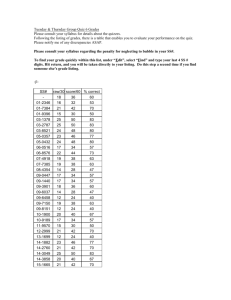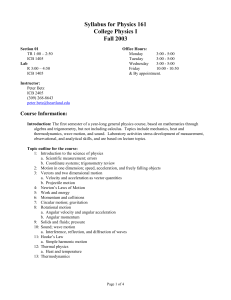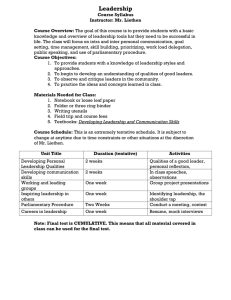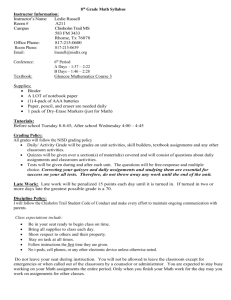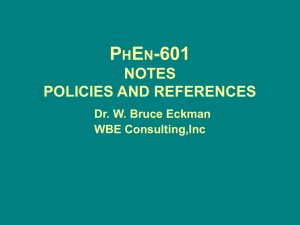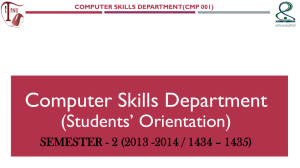Arkansas State University-Newport`s mission is to provide an
advertisement
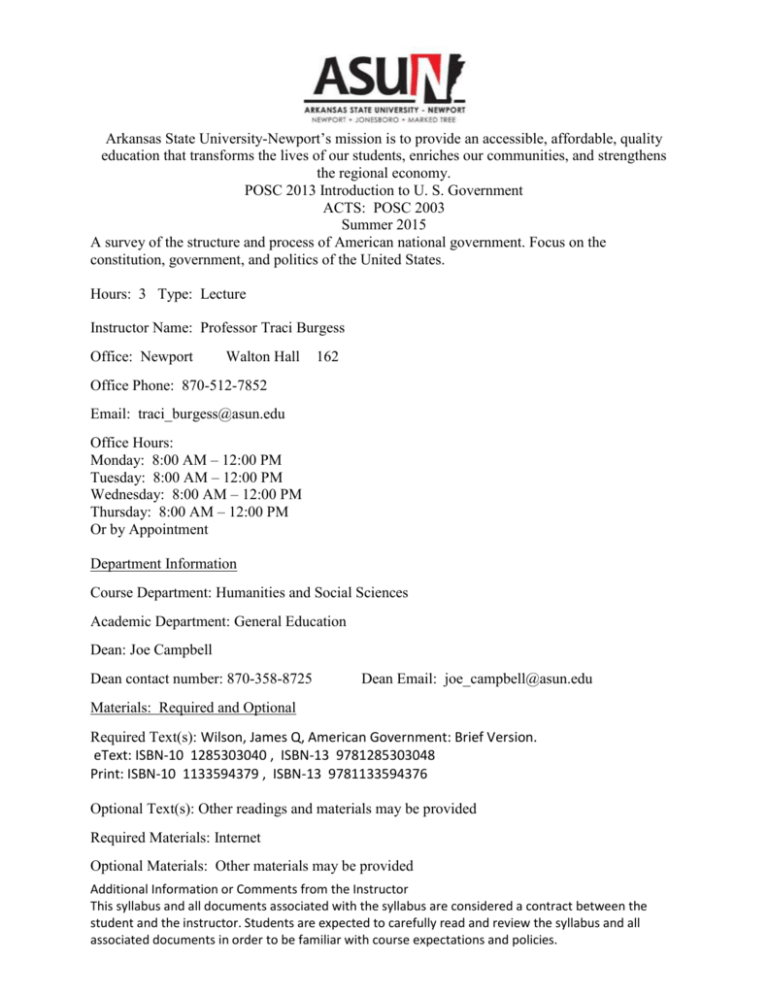
Arkansas State University-Newport’s mission is to provide an accessible, affordable, quality education that transforms the lives of our students, enriches our communities, and strengthens the regional economy. POSC 2013 Introduction to U. S. Government ACTS: POSC 2003 Summer 2015 A survey of the structure and process of American national government. Focus on the constitution, government, and politics of the United States. Hours: 3 Type: Lecture Instructor Name: Professor Traci Burgess Office: Newport Walton Hall 162 Office Phone: 870-512-7852 Email: traci_burgess@asun.edu Office Hours: Monday: 8:00 AM – 12:00 PM Tuesday: 8:00 AM – 12:00 PM Wednesday: 8:00 AM – 12:00 PM Thursday: 8:00 AM – 12:00 PM Or by Appointment Department Information Course Department: Humanities and Social Sciences Academic Department: General Education Dean: Joe Campbell Dean contact number: 870-358-8725 Dean Email: joe_campbell@asun.edu Materials: Required and Optional Required Text(s): Wilson, James Q, American Government: Brief Version. eText: ISBN-10 1285303040 , ISBN-13 9781285303048 Print: ISBN-10 1133594379 , ISBN-13 9781133594376 Optional Text(s): Other readings and materials may be provided Required Materials: Internet Optional Materials: Other materials may be provided Additional Information or Comments from the Instructor This syllabus and all documents associated with the syllabus are considered a contract between the student and the instructor. Students are expected to carefully read and review the syllabus and all associated documents in order to be familiar with course expectations and policies. Institutional Learning Outcomes Upon graduating from ASU-Newport with any Associate Degree, a student will be proficient in the following: • Oral and Written Communication Skills • Math Skills • Critical Thinking Skills • Technology Skills Course Learning Outcomes Upon the successful completion of this course, students will be able to: Identify the basic structure, functions, and processes of American government. Explain the historical and philosophical roots of the American political system and its function. Explain the ideological and structural inputs into policy making. Identify and explain the basic theories used by Political Science to understand American political behavior and political culture. Choose and apply relevant theory and data to an analysis of contemporary issues/policies using relevant theory and data. Learning Outcomes Assessments Reading Quizzes (15) Primary Source Activities (2) Critical Thinking Activities (2) Institutional Grading Scale Instructor Weighting Policy Grading Scale: A: 90-100 B: 80-89 C: 70-79 D: 60-69 F: 0-59 Reading Quizzes 30% Primary Source Activities 40% Critical Thinking Activities 30% Additional Information or Comments from the Instructor This syllabus and all documents associated with the syllabus are considered a contract between the student and the instructor. Students are expected to carefully read and review the syllabus and all associated documents in order to be familiar with course expectations and policies. Academic Dishonesty The ASUN policy for Academic Dishonesty can be found on pages 238-240 of the ASU— Newport Catalog (The Student Handbook Section). Cases of cheating and plagiarism can result in failing an assignment, failing the course, the student being reported to the Dean of General Education and/or a report of the event being placed in a student’s record. • Plagiarism detection software will be used to aid in maintaining academic honesty and integrity. • Academic dishonesty and plagiarism will not be tolerated. • The first offense will result in a 0 grade for the assignment. • The second offense will result in a failing (F) grade for the course and the reporting of the incident to the Dean of General Education. Americans with Disabilities Act Compliance In order to obtain appropriate disability related accommodations and services to which they are entitled, students with documented disabilities should voluntarily and confidentially provide the Office of Disability Services (870-358-8636 or disabilityservices@asun.edu ) with appropriate medical documentation regarding the nature and extent of their disability, make their needs known to this Office and follow established procedures for acquiring needed services and accommodations in the classroom or online. Information Technology Services If you experience any problems or issues with the Portal or other equipment, please contact ITS at 870-512-7783 or its@asun.edu. Course Policies and Procedures Correspondence Policy Please specify your correspondence policy. Provide the students with information concerning the best way to correspond concerning the class. Give students a general idea of how soon you will respond to their correspondence. You may also want to let them know that according to FERPA we cannot technically discuss grade issues via email or over the telephone because we have no idea who is actually sending the email or talking to us on the phone. Grades should be up to date on portal. Additional Information or Comments from the Instructor This syllabus and all documents associated with the syllabus are considered a contract between the student and the instructor. Students are expected to carefully read and review the syllabus and all associated documents in order to be familiar with course expectations and policies. Attendance Policy Because this is a summer course it will move rapidly. I would like to encourage everyone to login and participate in the course at least once a day. Classroom Policies Contacting the Instructor The best way to contact me is through email: traci_burgess@asun.edu. I check my email frequently throughout day and I have it programed to come in on my cell phone as well. That being said please understand that there are a lot of you and one of me. I do try to answer all my emails within 12 hours. When you email please include the course name and number in the subject line. POSC 2103 D1 25 - Intro to US Govern (Just copy exactly and paste in the subject line). Next, you may call me. If you call please leave a message and I will return your call as quickly as possible; within 12 hours. Another good way to contact me is through the course itself. Leave a message on one of your assignments or ask a question on the Classroom Chatter discussion forum. This is a good way to get feedback from your classmates as well. If you are having difficulty there is a good chance someone else in the class is as well. Student Online Code of Conduct Appropriate academic conduct includes doing assigned work, meeting deadlines, participating in online discussions, and completing all the required elements of the course. It also means following these basic rules of netiquette: • Using proper capitalization, spelling, and grammar. • Signing your name to all email messages and discussion postings. • Providing descriptive but concise subject lines. Furthermore, appropriate academic conduct means maintaining a safe learning environment based on mutual respect and civility. All participants in OTC Online courses are expected to behave professionally by adhering to these standards of conduct in the online environment: • Never transmit or promote content known to be illegal. • Respect other people's privacy as well as your own. • Forgive other people's mistakes. • Never use harassing, threatening, embarrassing, or otherwise abusive language or actions. Additional Information or Comments from the Instructor This syllabus and all documents associated with the syllabus are considered a contract between the student and the instructor. Students are expected to carefully read and review the syllabus and all associated documents in order to be familiar with course expectations and policies. Online communication that fails to meet these standards of conduct will be removed from the course. Repeated misconduct may result in being blocked from online discussions, receiving a grade penalty, or being dismissed from the course. If you ever feel as though our online classroom is inappropriate or uncomfortable, please first contact your instructor with your concerns. Course Outline Week 1: Chapter 1: Chapter 2: Chapter 3: Chapter 4: June 1 - 7 Primary Source Activity: Common Sense What Should We Know About American Government? Reading Quiz The Constitution Reading Quiz Civil Liberties Reading Quiz Civil Rights Reading Quiz Week 2: June 8 - 14 Critical Thinking Discussion (Civil Rights) Chapter 5: Chapter 6: Chapter 7: Chapter 8: Federalism Reading Quiz Public Opinion and the Media Reading Quiz Political Parties and Interest Groups Reading Quiz Campaigns and Elections Reading Quiz Week 3: June 15 - 21 Primary Source Activity: Reagan State of the Union Address 1982 Chapter 9: Congress Reading Quiz Chapter 10: The Presidency Reading Quiz Chapter 11: The Bureaucracy Reading Quiz Chapter 12: The Judiciary Reading Quiz Additional Information or Comments from the Instructor This syllabus and all documents associated with the syllabus are considered a contract between the student and the instructor. Students are expected to carefully read and review the syllabus and all associated documents in order to be familiar with course expectations and policies. Week 4: June 22 - 28 Critical Thinking Activity (The Media) Chapter 13: Making Domestic Policy Reading Quiz Chapter 14: Foreign and Military Policy Reading Quiz Chapter 15: How American Government has changed Reading Quiz Explanation of Assignments Reading Quizzes: Reading quizzes will be assigned for each chapter in your text. 1) 20 points each 2) All quizzes are due on the Sunday evening of the week assigned. 3) Quizzes are worth 40% of your overall grade Primary Source Activities: 1) 50 points each 2) Due dates: a. June 7: Common Sense b. June 21: Reagan State of the Union 1982 3) Read the primary source document and answer the corresponding questions. The primary source and questions can be accessed through the Coursework Tab on portal. 4) For all short answer questions, answer must be more than one or two words. Answer the questions completely. 5) Primary Source Activities are worth 30% of your overall grade Critical Thinking Activity 1) 50 points each 2) Due dates: a. Initial Post: June 10, 11:55 PM Responses Due by: June 14, 11:55 PM b. Initial Post: June 24, 11:55 PM Responses Due by : June 28, 11:55 PM 3) Participate in a discussion with your classmates based on your readings. I will post a thought provoking question on the Discussion Forum. Your responsibility is to discuss the question fully and respectfully. I encourage and fully expect that you will have varying opinions and ideas. Please follow the Student Online Code of Conduct. 4) You must make an initial post of 150 words before you can see the post of your peers. All initial posts are due by the Wednesday night (11:55 PM) the assignment is due. Additional Information or Comments from the Instructor This syllabus and all documents associated with the syllabus are considered a contract between the student and the instructor. Students are expected to carefully read and review the syllabus and all associated documents in order to be familiar with course expectations and policies. You must then respond to at least two (2) of your peers’ responses. Your responses must be at least 50 words in length. “I agree” or the likes is NOT an adequate response and will not receive credit. 5) Again…Your initial post is due by Wednesday night at 11:55 PM of the week the assignment is due. I will not give full credit for initial posts made after Wednesday night. I will not reopen a discussion once the dead line has past. Late Work and Retakes Late work and retakes will only be granted under extreme circumstances. If you are having difficulty please email me as quickly as possible and provide evidence of your situation. Additional Information or Comments from the Instructor This syllabus and all documents associated with the syllabus are considered a contract between the student and the instructor. Students are expected to carefully read and review the syllabus and all associated documents in order to be familiar with course expectations and policies. Primary Source Assignment 1: Common Sense Thomas Paine published the pamphlet, Common Sense, anonymously in 1776. Common Sense challenged the authority of the British government, and it became an instant best-seller, both in Europe and in the colonies. Written in plain language, it spoke to the common people of America and was the first work to openly ask for independence from Great Britain. Paine said, “The cause of America is, in the great measure, the cause of all mankind.” He used biblical references such as, “In the early ages of the world, according to the scripture chronology there were no kings; the consequence of which was, there were no wars; it is the pride of kings which throws mankind into confusion.” This document captured the sentiments and concerns of many colonists then, and it reminds us today of the dangers of tyrannical government. Read Common Sense and then take the brief quiz found in Coursework. Primary Source Assignment 2: Reagan’s State of the Union Speech of 1982 President Ronald Reagan’s State of the Union Speech of 1982 was his first. Presidents typically give their first address to both houses of congress in January of the year following their inauguration. The Constitution requires the President to address Congress from time to time with information on the State of the Union and recommends measures for their consideration. This is found in Article II, Section 3, and Clause 1 of the Constitution. Reagan’s speck was of particular importance due to the economic crisis of the time and the fact that he had recently survived an assassination attempt. Reagan’s administration marked a shift in policy from his recent predecessors on the Cold War and fiscal policy, and as is the case with all presidents, this message set the agenda for the coming year. Take a look at that speech and complete the associated assignment found in Coursework. Additional Information or Comments from the Instructor This syllabus and all documents associated with the syllabus are considered a contract between the student and the instructor. Students are expected to carefully read and review the syllabus and all associated documents in order to be familiar with course expectations and policies.
